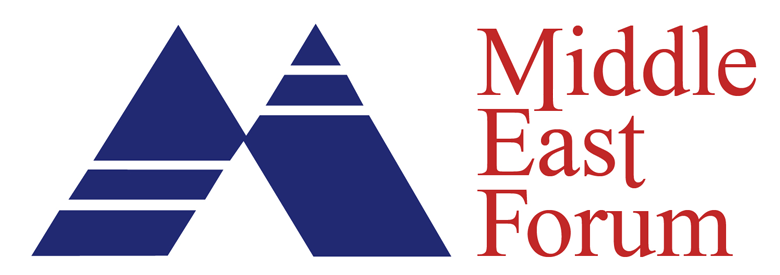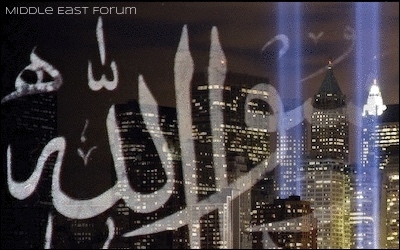
On September 11, 2001, Al-Qaeda's devastating attacks on the World Trade Center and the Pentagon catapulted the threat posed by Islamism to the forefront of American government. Already a leading U.S. think tank addressing the Islamist threat in 2001, the Middle East Forum then spent the next twenty years developing and advocating policies designed to ensure American victory over this enemy. The following amounts to a report card on this mission.
The Before Times
For over two decades prior to 9/11, from the time of Iran's Islamic Revolution in 1979, Islamists targeted U.S. embassies, planes, ships, barracks, and civilian centers, killing hundreds of Americans. These attacks took place mainly in the Middle East, but also in Europe and even the United States itself. But the U.S. government saw Islamist violence "not as the ideological war it is, but as a sequence of discrete criminal incidents," Middle East Forum President Daniel Pipes wrote in 1998.
| Prior to 9/11 Daniel Pipes warned repeatedly about the "profound menace" posed by radical Islam. |
Pipes, as the Wall Street Journal editorial board correctly noted, was "one of the few U.S. scholars to warn of the danger from militant Islam in advance of September 11." Prior to the 9/11 attacks he warned repeatedly about the "profound menace" posed by radical Islam to the United States and the international community. "The time has come for Westerners ... to understand that Islamism presents a truly global threat, and to devote the mental energy and material resources required to fight it," he wrote in April 2001. Specifically, he added two months later, "defeating Bin Ladin and his murderous gang will require the US government to deploy armed forces, not policemen and lawyers," and to combat Islamist ideology by promoting "the rise of moderate Muslims who will take the microphone out of the hands of extremists."
Pipes' warnings were met with outrage among (largely non-violent) Islamist groups in the United States, in particular the Council on American-Islamic Relations (CAIR), which accused him of anti-Muslim bias. But he repeatedly emphasized the distinction between Islamist ideology and the Islamic religion as practiced by most Muslims.
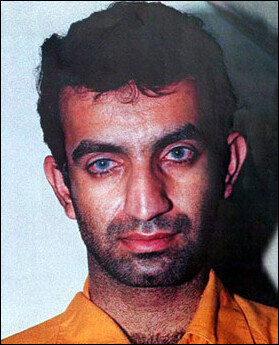 Ramzi Yousef, who directed the 1993 World Trade Center bombing, was not a model of Islamic probity. |
"Islamist terrorists kill in the name of Islam, but frequently are ... less observant Muslims than they are political extremists," he wrote, citing a slew of examples, such as the perpetrators of the USS Cole attack cheating their Yemeni landlord out of their final month's rent and the mastermind of the 1993 World Trade Center bombing frequenting strip clubs. "Traditional Muslims who live according to the precepts of [their] faith [and are] not inclined to force their vision on others via violence," he added, "deserve respect."
By and large, Pipes' warning were ignored by the American mainstream, even as the United States suffered from a series of high profile jihadist terror attacks in the years leading up to 9/11, notably the 1993 World Trade Center bombing, the 1996 massacre of U.S. military personnel at the Khobar Towers in Saudi Arabia, the 1998 U.S. east African embassy bombings, and the 2000 bombing of the U.S.S. Cole. U.S. officials responded by launching FBI investigations to investigate these crimes and prosecute those responsible. There was little sense in U.S. public statements that a common enemy was responsible for the attacks, and certainly no sense that the U.S. was at war with that enemy.
This Means War
That all changed on September 11, 2001. President George W. Bush declared a "war" against terrorists threatening the United States that very evening, and weeks later sent the military to crush Al-Qaeda and the Taliban regime that sheltered it in Afghanistan. Islamist terrorism "left the domain of criminality and entered that of warfare," recalled Pipes:
It meant no longer targeting just the foot soldiers who actually carry out the violence but the organizations and governments standing behind them. It meant relying on the armed forces, not policemen. It meant defense overseas rather than in American courtrooms. It meant organizations and governments sponsoring terrorism would pay a price, not just the foot-soldiers who carry it out. It meant dispensing with the unrealistically high expectations of proof so that when reasonable evidence points to a regime or organization having harmed Americans, U.S. military force can be deployed. It meant using force so that the punishment is disproportionately greater than the attack. It also meant that, as in conventional war, America's military need not know the names and specific actions of enemy soldiers before fighting them. There is no need to know the precise identity of a perpetrator; in war, there are times when one strikes first and asks questions later.
Growing numbers of American journalists, government officials, and other public figures now embraced Pipes' view of Islamism as a paramount strategic threat to the United States. In the year following 9/11, he wrote a book and 88 articles, gave 120 in-person lectures, and did 560 television and media appearances.
Just one week after 9/11, a joint session of Congress passed the Authorization for Use of Military Force (AUMF), which gave the president wide-ranging authority to use all "necessary and appropriate force" against those who "planned, authorized, committed or aided" the September 11 attacks. The AUMF was interpreted by President Bush and his successors to extend beyond Al-Qaeda to all armed Sunni Islamist groups sharing its core outlook and goals, such as the Islamic State (aka ISIS).
Following the 9/11 terrorist attacks, Congress passed the Patriot Act, which strengthened anti-Money Laundering/Combating Financing of Terrorism (AML/CFT) safeguards, expanded surveillance abilities of law enforcement, removed firewalls between federal agencies involved in counter-terrorism, and increased penalties for a range of terror-related crimes.
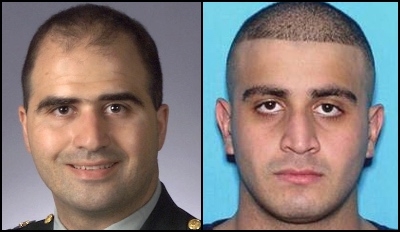 Nidal Malik Hasan (left) and Omar Mateen (right) murdered on their own initiative. |
Though the FBI has proven effective at thwarting organized terrorism plots, it has not been able to mount much of a defense against Islamists who strike on their own initiative without explicitly conspiring with or communicating their intentions to others. Notable examples include Nidal Malik Hasan, the U.S. Army major who killed thirteen Americans at Fort Hood, Texas, in November 2009, and Omar Mateen, who murdered 49 people at an Orlando nightclub in June 2016.
The media commonly refers to such attackers as "lone wolves," but MEF writing fellow A.J. Caschetta argues that this term, which implies social isolation and mental imbalance, is deeply misleading. In most cases, so-called "lone wolves" are not isolated from other Islamists – on the contrary, it is their sense of global community with others sharing the same ideology that propels them toward acts of violent self-sacrifice.
Conventional counter-terrorism methods are ineffective against the growing threat of so-called "lone wolves" – combatting the ideology that inspires and binds them together is the only way to reduce their numbers.
Combatting Islamism
"If the U.S. government wishes to weaken its strategic enemy, militant Islam," Pipes wrote in 2002, it must fight that enemy "wherever militant Islam poses a threat, in Muslim-majority countries (such as Saudi Arabia), in Muslim-minority countries (such as the Philippines), and even in the United States itself." Secondly, it must "promote moderate Muslims" as an antidote to militant Islam.

While President Bush only intermittently pointed the finger at Islamism, preferring instead to use the phrase "war on terror," the bipartisan 9/11 Commission Report did not mince words, calling not only for "dismantling the al Qaeda network," but also for "prevailing in the longer term over the ideology that gives rise to Islamist terrorism." The report also endorsed Pipes' argument that moderate Islam is the cure for radical Islam. "Tolerance, the rule of law, political and economic openness, the extension of greater opportunities to women – these cures must come from within Muslim societies themselves. The United States must support such developments."
In the intervening years, however, references to radical Islam have once again become taboo when discussing 9/11 and the ongoing threats posed by Al-Qaeda, ISIS, and other jihadist groups. During the Obama administration, U.S. officials routinely refused to ascribe Islamist motives to Islamist perpetrators of terror attacks. Obama himself famously referred to the Fort Hood massacre as "workplace violence." Assistant Secretary of Defense Paul Stockton's repeated refusals to affirm that Al-Qaeda is Islamist ("Al-Qaeda is a violent organization dedicated to overthrowing the values that we intend to advance.") during a December 2011 congressional hearing underscored how firmly the "no Islamism" directive was enforced throughout the administration. The Obama White House even muted the words "Islamist terrorism" from official video footage of remarks by visiting French President François Hollande and scrubbed references to Islamism from FBI counterterrorism training manuals, notes MEF writing fellow Raymond Stock.
| References to radical Islam have once again become taboo when discussing 9/11. |
Such denialism may be motivated by concerns about religious profiling, but profiling based on ideological beliefs is an essential component of fighting Islamist terror, argues Middle East Forum Director Gregg Roman. "The jihadists bent on terrorizing us have some obvious commonalities that the political and cultural establishment has continually enjoined us to ignore" for reasons that have nothing to do with making us safer, he wrote after the Orlando massacre. "Muslims who display evidence of extreme religious radicalization must be subject to some form of routine monitoring, not just those who show explicit violent intentions."
Although the Trump administration revived usage of terms such as "radical Islam" and "Islamism," denialism about the ideological roots of the 9/11 attacks has persisted among Democrat-run state and local governments. The 18th anniversary commemoration of the 9/11 attacks at ground zero in New York City contained "no mention of the evil that struck us that day," wrote MEF writing fellow Tarek Fatah. "If aliens were to drop by to watch the ceremony, they would get the impression that we were not commemorating the anniversary of an attack, but [of] some catastrophic natural disaster."
Domestic Islamism
In November 2001, Pipes wrote an article in Commentary warning that there are a "substantial body" of Muslims in the United States "who share with the suicide hijackers a hatred of the United States and the desire, ultimately, to transform it into a nation living under the strictures of militant Islam. Although not responsible for the atrocities in September, they harbor designs for this country that warrant urgent and serious attention." Accordingly, Pipes called for
the vigilant application of social and political pressure to ensure that Islam is not accorded special status of any kind in this country, the active recruitment of moderate Muslims in the fight against Islamic extremism, a keener monitoring of Muslim organizations with documented links to Islamist activity, including the support of terrorism, and the immediate reform of immigration procedures to prevent a further influx of visitors or residents with any hint of Islamist ideology.
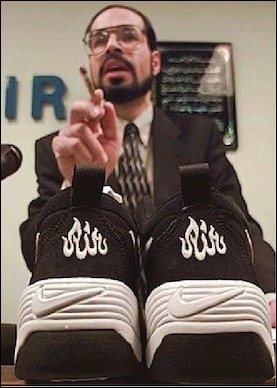 Nihad Awad, founder and executive director of CAIR, displays blasphemous Nike footwear in 1997. |
Prior to the 9/11 attacks, Islamist groups in America were at the height of their influence, in part because they claimed the mantle of representing the American Muslim community as a whole. In 1997, CAIR denounced Nike for putting a flame-like logo on its new "Air" line of basketball shoes that could "be interpreted" as the Arabic-script spelling of Allah. The giant manufacturer of athletic gear responded by, inter alia, changing the logo design, withdrawing products from "sensitive" markets, publicly apologizing to the Muslim community, and making donations to Muslim charities. "Successes like the Nike capitulation inspired an Islamist triumphalism" in the 1990s, writes Pipes.
According to Pipes, the 9/11 attacks served to "seriously impede the Islamist agenda in America" and CAIR exercises nowhere near the kind of influence that forced Nike to capitulate. "All Islamists, of course, desire what jihadist groups like al-Qaeda desire — the reestablishment of a global caliphate and enforcement of sharia law. But unlike al-Qaeda, most mature Islamists know that the time is not ripe for all-out violence, which only exposes their activities to greater scrutiny," explains MEF writing fellow Raymond Ibrahim.
However, domestic Islamist groups soon found their footing to regain influence in post-9/11 America. They learned to soften their public statements of support for the likes of Hamas and Hezbollah, and to avoid altogether acknowledging their goal of Islamizing America (which many Islamists were comfortable freely admitting in the 1990s). But their influence is equally pernicious.
In 2006, MEF established Islamist Watch, a project focused on monitoring lawful Islamist groups in the United States. Lawful Islamists advance their cause through lobbying politicians, shaping media coverage, suppressing free discussion of Islam, predatory lawsuits, influencing educational curricula, and other tactics allowable in an open society. Presenting themselves as representatives of the 3.5-million-strong American Muslim community, lawful Islamists turn their ire against anyone who acknowledges the link between Islamist ideology and Islamist violence.
The Obama administration's Countering Violent Extremism (CVE) program was intended to assist "efforts at the community level to counter violent extremist recruitment and radicalization to violence." However, far from combatting Islamism, the CVE program regarded Islamists as partners provided that they disavow violence. CVE grant recipients included the Muslim Public Affairs Council (MPAC), an organization with ties to the Muslim Brotherhood and a long history of sanitizing Islamist terrorism.
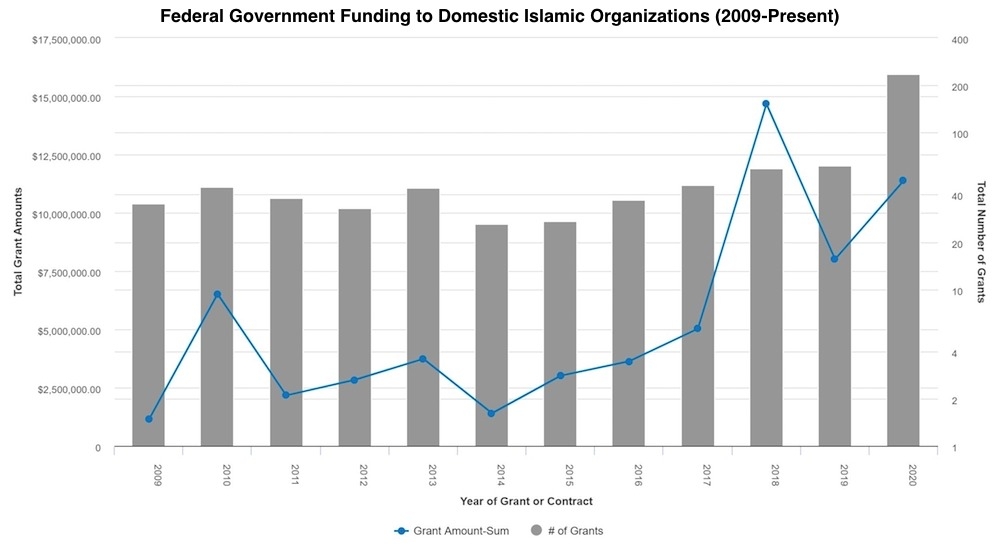
Although Donald Trump ran on a platform of combatting "radical Islam," his administration made little headway combatting domestic Islamism. CVE was shut down in favor of a new program called Targeted Violence and Terrorism Prevention (TVTP), but "the only difference [was] a shiny new name" argues Islamist Watch director Sam Westrop. Like its predecessor, TVTP ignored the simple reality that "those who espouse radical beliefs are more likely to commit radical acts." During the Trump administration, the "federal government gave out, on average, almost three times as much cash to American Islamic organizations per year as it did under Obama," notes Westrop.
Academia
The U.S. failure to detect the 9/11 attacks was widely attributed at the time to a lack of human intelligence sources, and the conventional wisdom held that America needed more people with specialized knowledge of Middle Eastern culture and languages (particularly Arabic). Accordingly, Congress approved a massive increase in Department of Education grants to Middle East studies centers at American universities under Title VI of the Higher Education Act of 1965.
The problem with this simple solution is that the field of Middle East studies "is pervaded by hostility to American aims, interests, and power in the Middle East, and peopled by tenured radicals who think of the United States as the incarnation of racist imperialism," explained then-Middle East Quarterly editor Martin Kramer. While "delighted to pocket taxpayers' money for themselves," Middle East studies academics "shudder at the thought of training students who might serve the U.S. government."
In 2002, MEF established Campus Watch to monitor and reform Middle East studies in the United States. Not surprisingly, it has documented widespread misuse of Title VI grants received by Middle East studies centers. The Title VI statute stipulates that these grants be spent on programs that "reflect diverse perspectives and a wide range of views." However, the money is typically used to support "politicized, biased, anti-American, anti-Israel, anti-Western teaching, scholarship, conferences, travel, you name it, in a variety of ways," says Campus Watch director Winfield Myers.
Working with Myers, the director of the Middle East Forum's Washington Project, Clifford Smith, persuaded congressional representatives to write letters to the Department of Education requesting it to investigate misuse of Title VI grants by the Duke/UNC Consortium for Middle East Studies (sparking an investigation that found "most ... activities supported with Title VI funds are unauthorized"), Georgetown University, the University of Arizona, the University of California at Berkeley, and Yale. "There is no good reason for accepting federal money and failing to adhere to the requirements of Title VI, but that's what's happening," explains Smith.
Another focus of Campus Watch is educating policymakers about the lack of transparency in foreign funding of American universities, particularly by Middle East governments with an interest in discouraging unbiased scholarship on Islamism and the Middle East. Qatar, the largest foreign donor to American universities, essentially pays for educational propaganda that "is not friendly to the West, to America, to Israel, to our allies, and certainly not to our national security," said Myers.
Conclusion
Twenty years after the 9/11 attacks, the U.S. record in combatting the threat posed by Islamist extremism is mixed. The U.S. military has decimated the overseas infrastructure and leadership of Al-Qaeda, ISIS, and affiliated organizations (though not the Taliban), while law enforcement agencies have thwarted dozens of terrorist plots against the U.S. homeland.
However, as Westrop has emphasized, "The United States ... still lacks a functioning national program to counter domestic Islamist activity," which has left the country vulnerable to homegrown terror attacks. Middle East studies programs at American universities remain deeply politicized and as unwilling as ever to play a constructive role in national security debates or provide students with the kind of training needed for government service. The U.S. struggle against radical Islam promises to be a long one, as does the Middle East Forum's campaign to better prepare for it.
Gary C. Gambill is general editor at the Middle East Forum. Follow him on Twitter and Facebook.
